Select Language
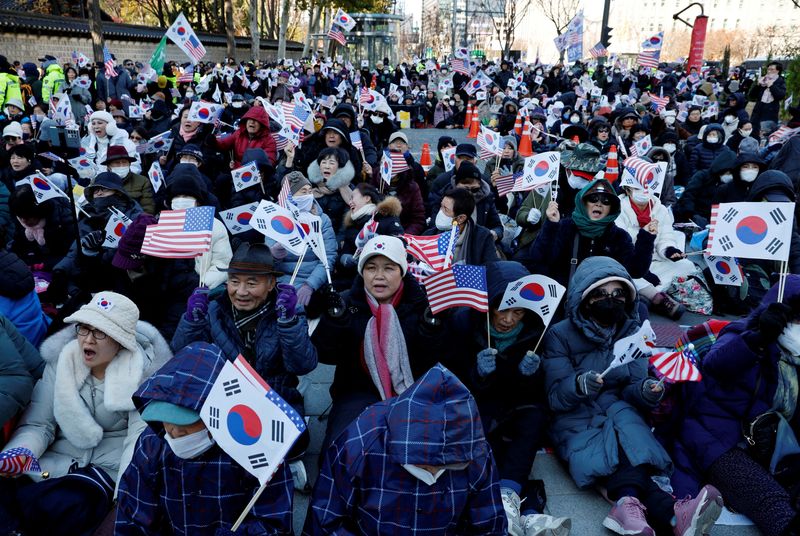
By Joyce Lee and Hyunjoo Jin
SEOUL (Reuters) -South Korea's parliament introduced a motion on Thursday to impeach President Yoon Suk Yeol over a botched attempt to impose martial law, while the defence minister blamed for advising the move and ordering troops to the parliament resigned.
Lawmakers from the opposition Democratic Party planned to put up a vote in parliament to impeach Yoon at around 7 p.m. (1000 GMT) on Saturday, a party spokesperson told reporters.
Yoon's ruling People Power Party is divided over the crisis but said it would oppose impeachment with two years left in Yoon's five-year term.
"The Yoon Suk Yeol regime's declaration of emergency martial law caused great confusion and fear among our people," Democratic Party lawmaker Kim Seung-won told a session of South Korea's National Assembly held in the early hours of Thursday.
The Democratic Party needs at least eight of the 108 ruling-party lawmakers to back the bill for it to pass with a two-thirds majority of the 300-seat parliament.
Fighting for his political future, Yoon accepted the resignation of Defence Minister Kim Yong-hyun on Thursday and nominated his ambassador to Saudi Arabia, Choi Byung-hyuk, as a replacement, Yoon's office said.
Kim had recommended Yoon declare martial law late on Tuesday, according to a senior military official and the filing to impeach Yoon by opposition members. Kim also ordered the deployment of troops to the parliament, Vice-Defence Minister Kim Seon-ho said, adding he was unaware of the martial law order until Yoon declared it.
"I have fundamentally opposed the mobilisation of military forces under martial law and have expressed negative opinions about it," he told a parliament hearing on Thursday, apologising and taking responsibility for failing to prevent it.
The declaration of martial law attempted to ban political activity and censor the media in Asia's fourth-largest economy and a key U.S. ally. It sparked outrage in the streets and concern among its international allies.
Japanese Prime Minister Shigeru Ishiba said Japan's "security situation may be fundamentally changed" in light of the instability in Seoul and North Korea's rising military assertiveness.
"What will happen to South Korea? There appears to be a great deal of domestic criticism and opposition," he told parliament on Thursday, adding that Yoon's efforts to improve relations with Tokyo "must never be undermined”.
There has been no reaction yet from North Korea to the drama in the South.
Secretary of State Antony Blinken told Reuters on Wednesday the United States had not been made aware in advance of Yoon's declaration, while his deputy, Kurt Campbell, said Yoon had badly misjudged it.
Yoon had been embraced by leaders in the West as a partner in the U.S.-led effort to unify democracies against growing authoritarianism in China, Russia and elsewhere.
But he caused unease among South Koreans by branding his critics as "communist totalitarian and anti-state forces". In November, he denied wrongdoing in response to influence-peddling allegations against him and his wife and he has taken a hard line against labour unions.
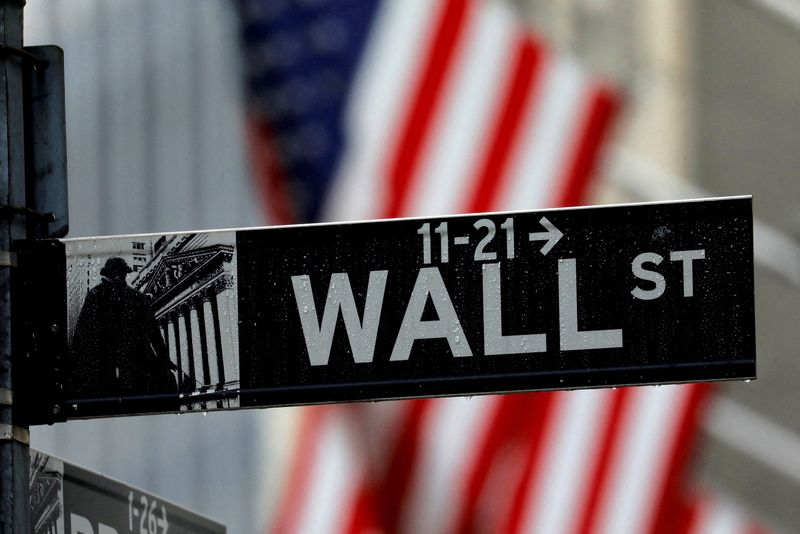
Investing.com-- U.S. stock index futures moved little on Wednesday evening, steadying after a record-high session on Wall Street amid persistent gains in the technology sector.
Investors were also encouraged by Federal Reserve Chair Jerome Powell flagging strength in the U.S. economy, which spurred flows into more economically sensitive sectors.
S&P 500 Futures fell slightly to 6,095.50 points, while Nasdaq 100 Futures fell 0.1% to 21,515.50 points by 18:53 ET (23:53 GMT). Dow Jones Futures steadied at 45,099.0 points.
Powell flags strength in the economy; Payrolls awaited
Powell said the economy was in a better place than as it appeared in September when the Fed began cutting interest rates, allowing the Fed to be more cautious in considering further easing.
Speaking at a New York Times (NYSE:NYT) event, Powell also flagged progress towards bringing down inflation, although his comments likely indicated support for a slower pace of rate cuts.
His comments are likely his last public statements before the Fed meets on December 17 and 18, where the central bank is widely expected to cut interest rates by 25 basis points.
But markets are uncertain over the longer term outlook, especially given that resilience in the U.S. economy could keep inflation sticky. President-elect Donald Trump’s protectionist trade policies are also expected to underpin inflation in the long term.
Still, investors latched on to the prospect of a stronger economy, sparking broad-based gains across Wall Street. Investors were also relieved by Powell not downplaying the prospect of a December cut.
Focus is now on upcoming nonfarm payrolls data for November, due on Friday. The reading is expected to show resilience in the labor market and is likely to factor into the outlook for U.S. interest rates.
Tech gains put Wall St at record highs
Wall Street indexes finished at record highs on Wednesday amid a persistent rally in major technology stocks. Positive earnings from Salesforce Inc (NYSE:CRM)- which surged 11%- were a key driver of gains, as was a sustained rally in market darling NVIDIA Corporation (NASDAQ:NVDA).
The S&P 500 rose 0.6% to a record high of 6,086.49 points, while the NASDAQ Composite rose 1.3% to a peak of 19,732.87 points. The Dow Jones Industrial Average ended up 0.7% at a record high of 45,014.04 points.
Wall Street has been on a tear since Trump’s election victory in early-November, with analysts expecting more gains as 2024 draws to a close.
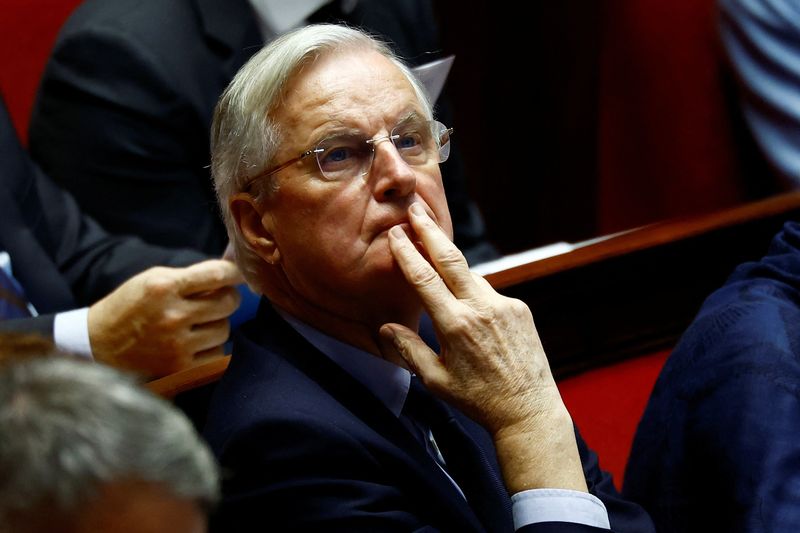
By Elizabeth Pineau and Michel Rose
PARIS (Reuters) -French lawmakers passed a no-confidence vote against the government on Wednesday, throwing the European Union's second-biggest economic power deeper into a crisis that threatens its capacity to legislate and tame a massive budget deficit.
Far-right and left-wing lawmakers joined forces to back a no-confidence motion against Prime Minister Michel Barnier, with a majority 331 votes in support of the motion.
Barnier now has to tender his resignation and that of his government to President Emmanuel Macron, making his minority government's three-month tenure the shortest lived in France's Fifth Republic beginning in 1958. He is expected to do so on Thursday morning, French media reported.
The hard left and far right punished Barnier for using special constitutional powers to adopt part of an unpopular budget without a final vote in parliament, where it lacked majority support. The draft budget had sought 60 billion euros ($63.07 billion) in savings in a drive to shrink a gaping deficit.
"This (deficit) reality will not disappear by the magic of a motion of censure," Barnier told lawmakers ahead of the vote, adding the budget deficit would come back to haunt whichever government comes next.
No French government had lost a confidence vote since Georges Pompidou's in 1962. Macron ushered in the crisis by calling a snap election in June that delivered a polarised parliament.
With its president diminished, France now risks ending the year without a stable government or a 2025 budget, although the constitution allows special measures that would avert a U.S.-style government shutdown.
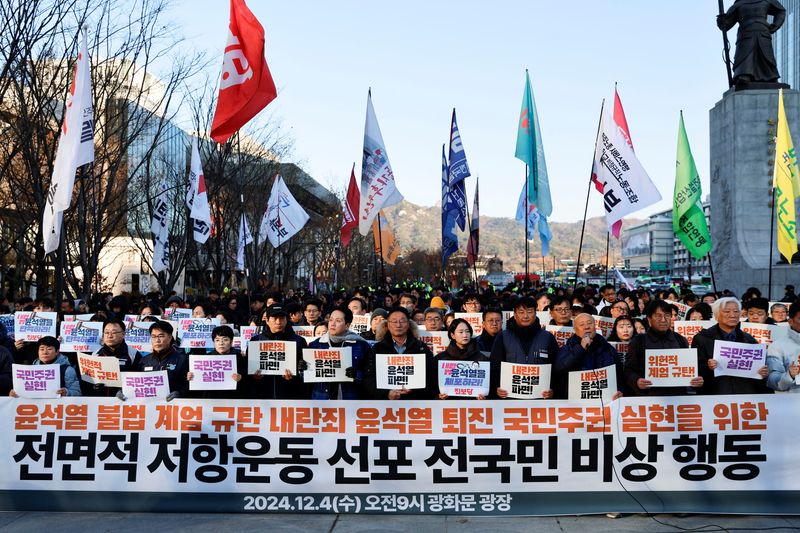
SEOUL (Reuters) -South Korean lawmakers on Wednesday called on President Yoon Suk Yeol to resign or face impeachment after he declared martial law only to reverse the move hours later, triggering a political crisis in Asia's fourth-largest economy.
The surprise declaration late on Tuesday ignited a standoff with parliament which rejected his attempt to ban political activity and censor the media, as armed troops forced their way into the National Assembly building in Seoul.
The main opposition Democratic Party called for Yoon, who has been in office since 2022, to resign or face impeachment.
“It was clearly revealed to the entire nation that President Yoon could no longer run the country normally. He should step down," senior DP member of parliament Park Chan-dae said in a statement.
Six South Korean opposition parties said they would submit Yoon's impeachment bill on Wednesday, the Democratic Party said in a message to reporters, with voting to take place on Friday or Saturday.
The leader of Yoon's ruling People Power Party called for Defence Minister Kim Yong-hyun to be fired and the entire cabinet to resign.
Yoon told the nation in a TV address late on Tuesday that martial law was needed to defend the country from nuclear-armed North Korea and pro-North anti-state forces, and protect its free constitutional order, although he cited no specific threats.
Chaotic scenes ensued as troops tried to seize control of the parliament building, parliamentary aides sprayed fire extinguishers to push them back, and protesters scuffled with police outside.
The military said activities by parliament and political parties would be banned, and that media and publishers would be under the control of the martial law command.
But lawmakers defied the security cordon and within hours of the declaration, South Korea's parliament, with 190 of its 300 members present, unanimously passed a motion requiring martial law be lifted, including all 18 members present from Yoon's party. The president then rescinded the declaration.
Protesters outside the National Assembly shouted and clapped. “We won!” they chanted, and one demonstrator banged on a drum.
"There are opinions that it was too much to go to emergency martial law, and that we did not follow the procedures for emergency martial law, but it was done strictly within the constitutional framework," a South Korean presidential official said in a statement, in the first public comments since Yoon lifted martial law.
More protests are expected on Wednesday with South Korea's largest union coalition, the Korean Confederation of Trade Unions, planning to hold a rally in Seoul and vowing to strike until Yoon resigns.
The U.S. embassy urged U.S. citizens in South Korea to avoid areas where protests were taking place, while some major employers including Naver Corp and LG Electronics Inc (KS:066570) advised employees to work from home.
Financial markets were volatile with South Korean stocks falling around 2% and the won steadying after plunging to a two-year low. Dealers reported suspected intervention by South Korean authorities to stem the won's slide.
Finance Minister Choi Sang-mok and Bank of Korea Governor Rhee Chang-yong held emergency meetings overnight and the finance ministry promised to prop up markets if needed.
"We will inject unlimited liquidity into stocks, bonds, short-term money market as well as forex market for the time being until they are fully normalised," the government said in a statement.
DODGED A BULLET
A major South Korean convenience store chain, which declined to be identified, said sales of canned goods, instant noodles and bottled water had soared overnight.
"I'm deeply disturbed by this kind of situation, and I'm very concerned about the future of the country," 39-year-old Seoul resident Kim Byeong-In told Reuters.
The National Assembly can impeach the president if more than two-thirds of lawmakers vote for it. A trial is then held by the constitutional court, which can confirm it with a vote by six of the nine justices.
Yoon’s party controls 108 seats in the 300-member legislature.
If Yoon resigned or was removed from office, Prime Minister Han Duck-soo would fill in as leader until a new election was held within 60 days.
"South Korea as a nation dodged a bullet, but President Yoon may have shot himself in the foot," Danny Russel, vice president of the Asia Society Policy Institute think tank in the United States, said of the first martial law declaration in South Korea since 1980.
U.S. Secretary of State Antony Blinken said he welcomed Yoon's decision to rescind the martial law declaration.
"We continue to expect political disagreements to be resolved peacefully and in accordance with the rule of law," Blinken said in a statement.
South Korea hosts around 28,500 American troops as a legacy of the 1950-1953 Korean War.
CPlanned defence talks and a joint military exercise between the two allies were postponed amid the broader diplomatic fallout from the overnight turmoil.
Sweden's prime minister postponed a visit to South Korea, a spokesperson said, and Japan's lawmaker group on Korean affairs cancelled a trip to Seoul slated for mid-December.
Yoon, a career prosecutor, squeezed out a victory in the tightest presidential election in South Korean history in 2022, riding a wave of discontent over economic policy, scandals and gender wars.
But he has been unpopular, with his support ratings hovering at around 20% for months.
His People Power Party suffered a landslide defeat at a parliamentary election in April this year, ceding control of the unicameral assembly to opposition parties that captured nearly two-thirds of the seats.
There have been more than a dozen instances of martial law being declared since South Korea was established as a republic in 1948.
In 1980, a group of military officers forced then-President Choi Kyu-hah to proclaim martial law to crush calls for the restoration of democratic government.
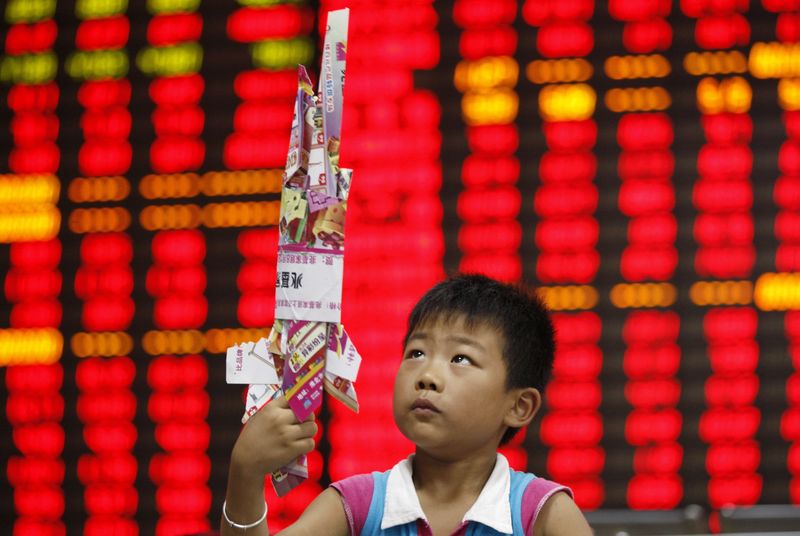
Investing.com-- Most Asian stocks dropped on Wednesday, led by a slump in South Korean shares after President Yoon Suk-Yeol's abrupt reversal of a short-lived martial law stirred political unrest and eroded investor confidence across the region.
Regional markets took middling cues from a mildly positive overnight session on Wall Street, as investors awaited more cues on U.S. monetary policy from an address by Federal Reserve Chair Jerome Powell later in the day. U.S. stock index futures were mildly positive in Asian trade.
South Korean stocks slide on martial law tensions
South Korea's KOSPI index slumped more than 2% after President Yoon Suk-Yeol declared martial law on Tuesday in an effort to counter “anti-state forces” among his political opponents. However, the move faced immediate backlash, including parliamentary rejection and public protests, leading him to revoke the measure within hours.
In response, South Korean legislators demanded Yoon's impeachment, plunging the nation into its most significant political crisis in decades.
Martial law involves replacing civilian governance with military rule, suspending civilian legal processes in favor of military ones, and potentially suspending standard civil liberties for its duration.
Yeol's move undermined investor confidence in the country, with ING analysts stating that sustained turmoil could even bring down South Korea's credit rating.
Asia markets fear spillover from South Korea
Markets grew wary of any potential spillover from political turmoil in South Korea, given that the country is seen as a major pillar in East Asia's economy.
Japan's Nikkei 225 fell 0.4%, while the TOPIX declined 0.7%. "We are monitoring (the South Korea's situation) with particular and grave interest," Japan's Prime Minister Shigeru Ishiba told reporters.
In China, the Shanghai Shenzhen CSI 300 index fell 0.3% and Shanghai Composite index was slightly lower. Data showed that China's services sector growth slowed in November, with the Caixin PMI index dropping to 51.5 from 52.0, reflecting weaker growth in new business and exports, as the economy braces for more U.S. tariffs under a second Donald Trump administration.
Asia faces heightened geopolitical risks, including the specter of U.S. trade tariffs under Trump’s administration. Regional markets and economies were rattled by the U.S. imposing stricter controls on technology exports to China this week.
But Chinese chipmaking stocks surged on Wednesday as the government recommended against buying U.S.-made chips- a move that could spur increased demand for locally-made chips.
Philippine's PSEi Composite index inched 0.2% lower, while India's Nifty 50 Futures indicated a positive open.
Thailand's SET Index climbed 1.3% on Wednesday, a day after country's finance minister Pichai Chunhavajira stated that there was potential for a rate cut due to low inflation, but emphasized that the final decision rests with the central bank. He also reiterated the importance of aligning monetary and fiscal policies to support the nation's economy.
Australian stocks hit by weak GDP
Australia's ASX 200 fell 0.5% on Wednesday after gross domestic product data showed the country's economy grew less than expected in the September quarter.
While the reading did ramp up bets that the Reserve Bank of Australia could cut interest rates sooner than expected, it also showed that the Australian economy was struggling amid sticky inflation and high interest rates.
The soft GDP was driven largely by weak household spending, while a drop in commodity export prices also weighed.
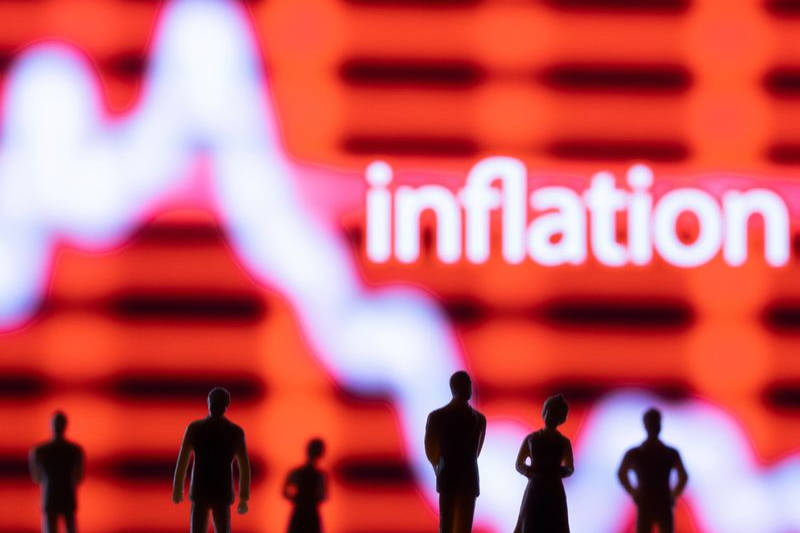
Investing.com-- Goldman Sachs expects increased U.S. trade tariffs under a Trump presidency, especially against China, to delay inflation from reaching the Federal Reserve's 2% annual target in 2025.
The brokerage said that recent inflation data showed disinflation still remained sluggish, and that inflation was expected to peter out further in the remainder of 2024.
Core personal consumption expenditures inflation- the Fed’s preferred inflation gauge- is expected to slow to a 0.16% average pace in the final two months of 2024, GS said in a note.
But the brokerage warned that tariffs are likely to “delay a return to 2% inflation in 2025.”
“We expect tariff increases on imports from China and autos that raise the effective tariff rate by 3-4 percentage points (pp), which we estimate would raise core PCE inflation by about 0.3-0.4pp next year, leaving it at 2.4% in December 2025,” GS analysts wrote in a note.
Still, they said that inflation from tariffs was likely to be a one-time increase, and would not deter a trend of falling inflation.
Excluding the impact of tariffs, GS expects core consumer price index inflation to fall to an annual pace of 2.4% in December 2025 from 3.2% in December 2024, amid easing housing and transportation costs.
The brokerage noted that sequential measures of underlying inflation had eased in recent months, and that high inflation prints seen earlier this year appeared to be more of residual seasonal factors than a reacceleration in inflation.
Concerns over higher U.S. import tariffs grew in recent weeks after President-elect Donald Trump threatened to impose higher duties on several countries, including the BRICS bloc, Canada, and Mexico.
Trump had also pledged a 10% tariff on all imports to the U.S., and 60% in additional tariffs on imports from China.
The President-elect is expected to dole out increase corporate tax breaks and expansionary policies in the coming years, potentially underpinning inflation and interest rates in the long term.
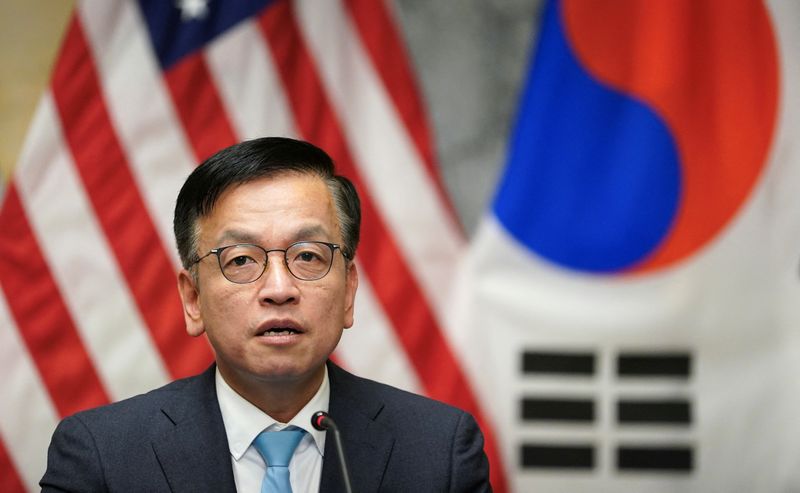
By Cynthia Kim
SEOUL (Reuters) -South Korea's finance ministry said on Wednesday it is ready to deploy "unlimited" liquidity into financial markets if needed after President Yoon Suk Yeol lifted a martial law declaration he imposed overnight that pushed the won to multi-year lows.
The announcement came after Finance Minister Choi Sang-mok and Bank of Korea Governor Rhee Chang-yong held emergency meetings overnight, and ahead of the BOK's extraordinary meeting session abruptly scheduled for 9 a.m. local time (0000 GMT) on Wednesday.
"All financial, FX markets as well as stock markets will operate normally," the government said in a statement.
"We will inject unlimited liquidity into stocks, bonds, short-term money market as well as forex market for the time being until they are fully normalised."
South Korea's won trimmed some losses early on Wednesday but stayed near two-year lows after Yoon lifted his shock martial law declaration, honoring a parliamentary vote against the measure.
South Korea's parliament, with 190 of its 300 members present, unanimously passed a motion on Wednesday requiring the martial law be lifted.
U.S.-listed South Korean stocks fell, while exchange-traded products in New York including iShares MSCI South Korea ETF and Franklin FTSE South Korea ETF lost about 1% each.
The Korean won also fell sharply against the yen to the weakest since May 2023, down 2.5%.
The political turmoil comes as Yoon and the opposition-controlled parliament clash over the budget and other measures.
The opposition Democratic Party last week cut 4.1 trillion won from the total budget proposal of 677.4 trillion won ($470.7 billion) the Yoon's government submitted, putting the parliament in a deadlock over control of the 2025 annual budget.
The parliamentary speaker on Monday stopped the revised budget from going to a final vote.
A successful budget intervention by the opposition would deal a major blow to Yoon's minority government and risk shrinking fiscal spending at a time when export growth is cooling.
"The negative impact to the economy and financial market could be short-lived as uncertainties on political and economic environment could be quickly mitigated on the back of proactive policy response," Citi economist Kim Jin-wook said in a report.
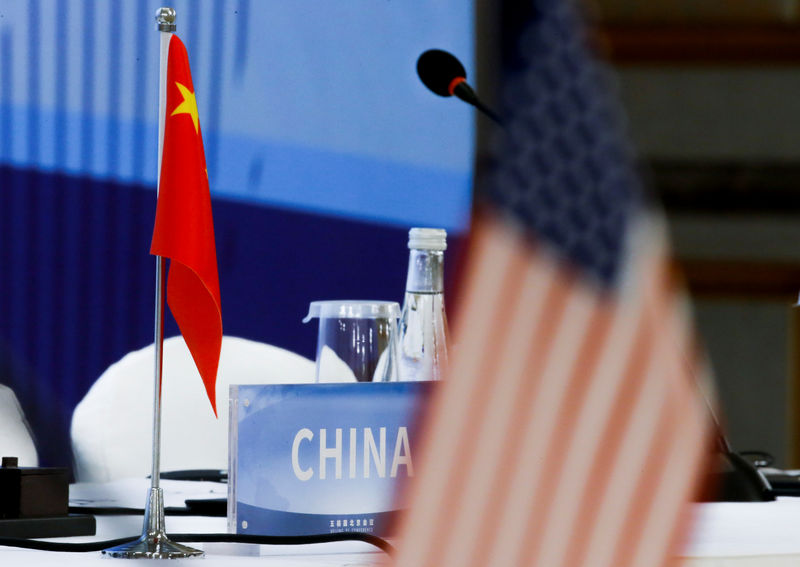
Investing.com-- A renewed U.S.-China trade conflict may be on the horizon as President-elect Donald Trump threatens new tariffs on Chinese imports, Bank of America (BofA) analysts said in a note.
Trump announced plans for a 10% tariff on Chinese goods and a 25% levy on imports from Mexico and Canada, citing concerns over fentanyl trafficking and immigration. BofA analysts expect these measures to intensify trade tensions and disrupt bilateral trade flows if implemented in early 2025.
"In theory, if Trump opts to adopt the executive order route to impose unilateral tariffs, the shock could come in shortly after he assumes office in early Jan. Else, if he instead chooses to ask Congress to enact new legislation, the tariff would kick in later but be harder to revoke," BofA analysts wrote.
The proposed tariffs echo the trade war of 2018-2020, which saw tariffs imposed on over half of U.S.-China trade, causing bilateral trade volumes to plummet. Chinese exports to the U.S. declined as tariffs increased, although Beijing managed to redirect some goods to alternative markets.
BofA analysts predict a similar trajectory if new tariffs are enacted. In a worst-case scenario, where a 60% blanket tariff is applied to Chinese imports, U.S. businesses dependent on Chinese goods could face severe disruptions. Key sectors, such as festive products and portable lamps, which source up to 90% of their imports from China, may struggle to find alternatives.
China is likely to respond cautiously, according to BofA. Although tit-for-tat tariffs are possible, China's smaller import volume from the U.S. limits the impact of such measures. Other options, like currency devaluation or restricting U.S. businesses in China, carry significant economic risks for Beijing, including potential capital outflows and diminished investor confidence.
Instead, Chinese policymakers may focus on stimulating domestic demand and exploring energy trade deals to mitigate losses. An increase in imports of U.S. goods, particularly liquefied natural gas (LNG) and oil, could be a negotiating tool to de-escalate tensions, BofA suggests.
While Trump’s stance reflects bipartisan support for reducing reliance on Chinese imports, BofA analysts see potential for negotiations. High U.S. inflation may reduce public tolerance for sweeping tariffs, which could exacerbate living costs and strain supply chains.
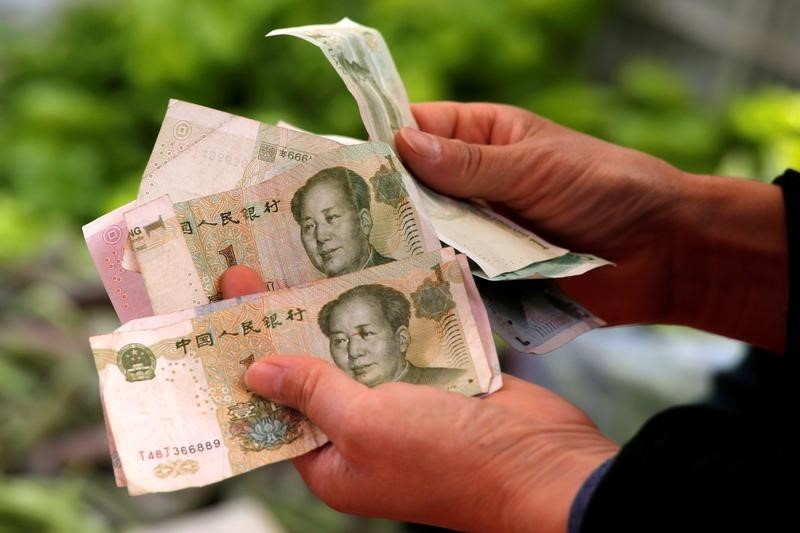
Investing.com-- Most Asian currencies extended declines on Tuesday with the Chinese yuan hitting a one-year low, as markets assessed the impact of new U.S. export restrictions targeting China’s semiconductor industry.
The U.S. is set to implement its third major crackdown on China's semiconductor industry, targeting 140 entities with new export restrictions aimed at curbing China’s access to advanced chips and equipment vital for artificial intelligence and other high-tech applications.
The move, which is seen as a direct challenge to China's technological ambitions, stirred volatility in regional currency markets, particularly for the Chinese yuan.
This comes at a time when sentiment around regional currencies had already been dampened due to U.S. President-elect Donald Trump's recent threat to impose 100% tariffs on goods from BRICS nations (Brazil, Russia, India, China, and South Africa) if they move to undermine the U.S. dollar by creating or backing alternative currencies. Before that, he vowed to impose additional tariffs on China.
Chinese yuan hits 1-yr low on new US export curbs
The Chinese yuan fell against the dollar, with the onshore USD/CNY pair rising 0.3% to its highest level since mid-November 2023.
The latest export restrictions are expected to exacerbate China’s challenges in its push for technological self-sufficiency, further dampening investor sentiment towards the yuan.
Markets across the region are closely watching the U.S.-China trade situation, with fears of further restrictions or retaliatory measures adding to the volatility.
The Australian dollar, which is sensitive to the Chinese economy, weakened slightly, with the AUD/USD pair remaining close to four-month lows. Third-quarter Australian gross domestic product data is due on Wednesday.
Dollar strength creates further pressure on Asia FX
Asian currencies have also faced downward pressure from the dollar, which gained for eight consecutive weeks before falling in the last one. Expectations of a slower rate cut path due to stubborn inflation and chances of inflation remaining high with the incoming president Trump have supported the greenback.
The US Dollar Index extended gains, inching up 0.1%, while the US Dollar Index Futures also ticked up 0.1%.
The South Korean won's USD/KRW pair, heavily influenced by semiconductor exports, was largely unchanged. South Korean consumer inflation read softer than expected for November, keeping the prospect of more interest rate cuts by the Bank of Korea in play.
The Japanese yen's USD/JPY pair rose 0.4%, and the Taiwan dollar's USD/TWD pair edged 0.2% higher, while India's USD/INR was muted.
The Philippine peso's USD/PHP pair was largely unchanged at 58.685 per U.S. dollar.
The Philippines revised its 2024 economic growth forecast, lowering the target to 6.0%–6.5%, down from a previous high of 7%. This adjustment comes amid ongoing domestic and global uncertainties, according to a government panel. Additionally, the peso’s expected average for 2024 has been adjusted to a range of 57.00–57.50 per dollar, from the earlier estimate of 56.00–58.00.

By Patricia Zengerle
(Reuters) -The United States will send Ukraine $725 million of missiles, ammunition, anti-personnel mines and other weapons, Secretary of State Antony Blinken said on Monday, as President Joe Biden's outgoing administration seeks to bolster Kyiv in its war with Russian invaders before leaving office in January.
The assistance will include Stinger missiles, ammunition for High Mobility Artillery Rocket Systems (HIMARS), drones and land mines, among other items, Blinken said in a statement.
Reuters reported last week that the Biden administration planned to provide the equipment, much of it anti-tank weapons, to ward off Russia's attacking forces.
Moscow's troops have been capturing village after village in Ukraine's east, part of a drive to seize the industrial Donbas region, while Russian airstrikes target a hobbled Ukrainian energy grid as winter sets in.
"The United States and more than 50 nations stand united to ensure Ukraine has the capabilities it needs to defend itself against Russian aggression," Blinken's statement said.
The announcement marks a steep uptick in size from Biden's recent use of so-called Presidential Drawdown Authority (PDA), which allows the U.S. to draw from current weapons stocks to help allies in an emergency.
Recent PDA announcements have typically ranged from $125 million to $250 million. Biden has an estimated $4 billion to $5 billion in PDA already authorized by Congress that he is expected to use for Ukraine before Republican President-elect Donald Trump takes office on Jan. 20.
WAITING FOR TRUMP
Trump is widely expected to change U.S. strategy on Ukraine, after he criticized the scale of Biden's support for Kyiv and made quickly winding down the war a central campaign promise. Last week, he picked Keith Kellogg (NYSE:K), a retired lieutenant general who presented him with a plan to end the war, to serve as special envoy for the conflict.
Kellogg's plan for ending the war, which began when Russia invaded Ukrainian sovereign territory, involves freezing the battle lines at their prevailing locations and forcing both Kyiv and Moscow to the negotiating table, Reuters reported in June.
The tranche of weapons represents the first time in decades that the United States has exported land mines, the use of which is controversial because of the potential harm to civilians.
Although more than 160 countries have signed a treaty banning their use, Kyiv has been asking for them since Russia launched its full-scale invasion in early 2022, and Russian forces have used them on the front lines.
The land mines that would be sent to Ukraine are "non-persistent," with a power system that lasts for just a short time, leaving the devices non-lethal. This means that - unlike older landmines - they would not threaten civilians indefinitely.

